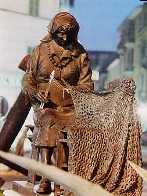
Wanted
and fulfilled by Inner Wheel - Rotary club of the city and officially
unveiled in 1991, the monument "Retara", a bronze work by the
sculptor Aldo Sergiacomi, is a rightful homage paid to one of the
typical figures of the city, that is to say to the symbol-woman who
incessantly made and mended the essential working tool of a
fisherman: the net.
The
city pays its tribute to this typical women's job, today
disappeared, as the development of fishing activities is linked to it
and as it also represents its story, its culture and one of the
economic forces on which the city in based.
There
is a sentence taken from a poem written in dialect by G. Vespasiani
and actually dedicated to retara enriching the marble basement of the
monument which says:
Appene l'alba
schiare le culline
la prima a sturnellà je' la
retare,
rrémpie de spaghe la lenguetta fine
e annòde
tante maje pe' 'lla mmare.
by GIOVANNI VESPASIANI
(When the morning comes retara is the first one to sing, fill her bobbin with string and getting ready to make lots knots to go to sea, ... by Giovanni Vespasiani)
Voluto e realizzato dall'Inner Wheel - Rotary club della città e inaugurato nel 1991, il monumento alla retara, opera in bronzo dello scultore Aldo Sergiacomi, è un doveroso omaggio ad una delle figure tipiche della città, a colei che, instancabile, realizza e ripara il principale strumento di lavoro del pescatore, la rete appunto. A questa tipica professione femminile, ormai scomparsa, si deve un grande contributo allo sviluppo dell'attività di pesca che è poi insieme la storia, la cultura e una delle principali forze economiche su cui S. Benedetto si regge.
Una frase tratta da una poesia in vernacolo di G. Vespasiani proprio dedicata alla retara arricchisce il basamento in marmo dell'opera:
Appene l'alba schiare le culline
la prima a sturnellà je' la retare,
rrémpie de spaghe la lenguetta fine
e annòde tante maje pe' 'lla mmare.
Giovanni Vespasiani